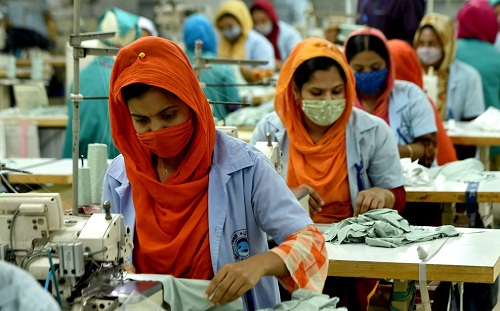 Dominique Muller from the Labor Behind the Label believes, the fashion industry is the root cause of exploitation of low-paid and undervalued workforce in development. He and other industry experts say, COVID-19 has highlighted the exploitative nature of global garment supply chains. In an Open Democracy report, experts advise fashion brands to end exploitation in supply chains and offer fair salaries and working conditions.
Dominique Muller from the Labor Behind the Label believes, the fashion industry is the root cause of exploitation of low-paid and undervalued workforce in development. He and other industry experts say, COVID-19 has highlighted the exploitative nature of global garment supply chains. In an Open Democracy report, experts advise fashion brands to end exploitation in supply chains and offer fair salaries and working conditions.
Pandemic exposes workers’ realities
Labor exploitation in garment supply chains began with the rise of globalization in the 1970s. Previously, the direct employees of fashion brands, garment workers became distant actors in complex global supply chains. Fashion brands were no longer held responsible for paying fair wages or offering employment benefits to their workers. COVID-19 has exposed this dark reality of brands, retailers and manufacturers, says Kalpona Akter, Executive Director, Bangladesh Center for Workers Solidarity. According to her, for years, brands and manufacturers have been exploiting workers by refusing to pay their salaries
A recent study by the Worker Rights Consortium further reports a 21 per cent decline in workers’ incomes between March and August 2020 – with monthly wages falling from $187 to $147. They are made to work overtime without being paid even their minimum wages, adds Akter. Even when workers are paid full wages, 30 per cent goes on housing. A 20 per cent wage cut forces them and their children to starve as they still have to pay for accommodation and other compulsory charges, states Akter.
monthly wages falling from $187 to $147. They are made to work overtime without being paid even their minimum wages, adds Akter. Even when workers are paid full wages, 30 per cent goes on housing. A 20 per cent wage cut forces them and their children to starve as they still have to pay for accommodation and other compulsory charges, states Akter.
Workers in Sri Lanka also face a similar situation. Abiramy Sivalogananthan, Asia Floor Wage Alliance, explains, many workers in Sri Lanka’s vast free trade zones are migrant workers who support not just themselves but their families in rural villages. Workers also lost their December bonus due to the pandemic. This bonus helps them pay off their debts.
Sharp decline in retailers’ profits
The pandemic has affected not just workers but also many fashion retailers across the globe. For instance, retailers in North America and Europe– including Philip Green’s Arcadia collapsed. In the US over 25,000 physical shops were closed and McKinsey expects fashion companies to post a 90 per cent decline in profits in 2020. According to a McKinsey report based on2018 data, the top 20 fashion corporations based on total annual profits including Nike, H&M, Zara’s parent company Inditex, Lululemon, and adidas and luxury companies like Burberry, Kering, and Hermes which are ‘Super Winners’, have managed to weather the COVID-19 storm with 22 per cent higher indexed stock valuations. By October 2020, the share price of these corporations was 11 per cent higher than pre-crisis levels. It attributes their success to robust digital presence and quick diversification to the Asia Pacific region which has been less affected by the pandemic than the US and Europe.
Need for a human-centered approach
Henceforth, the fashion industry needs to adopt a sustainable and human-centered approach to rebuild its past glory, say experts at the International Labor Organization. It needs to ensure fair salaries and conditions for garment manufacturers in the Global South. It needs to work towards building a more resilient, inclusive, sustainable and garment industry, adds Tara Rangarajan, Head, Brand Engagemen, Better Work Program, ILO.
As COVID-19 disrupts work and health, workers are being forced to work when feeling unwell. They just take Panadol or a vitamin C tablet to pass through the temperature checks on fear losing jobs if they don’t show up for work. The profit model has not only made lower strung of supply chain more vulnerable to economic pain, it has also pushed the social and personal costs of the virus onto the same people. Muller believes the industry needs to adopt a new way of thinking that does not exempt the brands from responsibility for their workers. He further opines governments across the globe need to introduce a new law to curtail worker exploitation and hold companies responsible for labor abuses.












